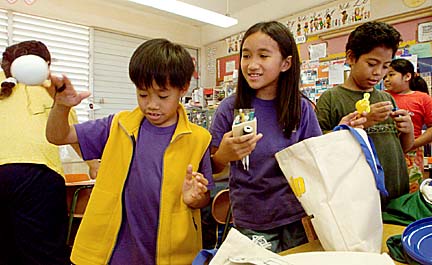


|
The gift from the National Institutes of Health didn't magically make Kalihi-Waena Elementary School fourth-graders love milk, but they learned why they should be drinking it. Out of the Box
Kalihi-Waena School fourth-graders
have a healthy relationship
with national officialsBy Helen Altonn
haltonn@starbulletin.com"From 8 years to 19, you're supposed to drink 1,300 milligrams a day," said student Brandon Simpliciano.
Does he?
"No, I hate milk," he said.
Andrew Subia said, "I used to hate milk, but now I like it because it has calcium."
The nutritional value of milk is just one of many health topics being studied by Joyce Tsuda's 29 students because of a special friend at the nation's leading medical research center in Bethesda, Md.

|
Dr. Yvonne T. Maddox, deputy director of the National Institutes of Health and the National Institute of Child Health and Development, visited the Kalihi class with Rep. Dennis Arakaki (D, Kamehameha Heights-Kalihi Valley) while she was here in November for a conference.Organizing her visit was Doug Yee, Hawaii member of the NIH Directors Council of Public Representatives.
Maddox enjoyed the fourth-graders so much, she began sending them surprise boxes each month to promote health awareness and interest in science and health professions.
Every student gets a bag with information and items from some of the 27 NIH institutes and centers based on national health observances each month.
Tsuda said she received a call from Maddox's office asking what kinds of things she could use in her classroom. "They told me they want to send goody bags once a month."
The boxes began arriving in February with bags filled with such things as water bottles, toothpaste and brushes, NIH pens, heart-shape key chains and information about nutrition, dental and heart health, low vision and other topics.
Tsuda said the kids "are just so in awe" that someone would send them such gifts.
"I had no idea it would be this kind of big project. I was flabbergasted because when she first came, she didn't spend much time with us, but I think she was surprised. It's a terrific class. They were very polite. She kept saying, 'I must do something for you.'"
A map, organizational chart and other information about NIH were in the first box, and Tsuda said she made a grid to see if the students could identify the buildings of the different institutes.
"We're studying X and Y coordinates, so everything fits in very well."
The excited kids opened the April bags Tuesday, finding green polo shirts (which most still have to grow into) from the National Cancer Institute, pencils, sharpeners, bubble pens, a yo-yo ball, Frisbee, computer screen wiper and a lanyard for keys.
The National Institute on Aging contributed shoelaces in celebration of WalkAmerica April 27-28 "to remind you that walking is a great exercise," Maddox wrote.
Pamphlets described research at the cancer institute to find a cure for cancer, how to prevent childhood sports injuries and the importance of eating five fruits and vegetables daily. A questionnaire was enclosed to test the students about sleep.
Among big hits in the three boxes were gray brain-shape and red heart-shape squeeze balls, yo-yo balls, Frisbees, bubble pens and disposable cameras.
Tsuda took the "brains" from kids having trouble doing assignments and put them in a jar with a sign, "Use it or lose it," to remind them to do their work. "Once I took them away, I got very good response."
Cameras are provided in every box so the students can take pictures of each other to send to NIH. "Last time, we sent 72 pictures," Tsuda said.
"It was great to see pictures of you studying and having fun with all the health information I sent," Maddox wrote in a letter with the April gifts.
"I am particularly excited about this Surprise Box for April. The canvas bags from the National Institute on Deafness and Other Communication Disorders (NIDCD) are filled with so much wonderful information Nau wale no! (just for you). How is my Hawaiian?"
"It's very nice of them to give us this," said Ryan Martin.
What have the kids learned from all the health material?
Larmay Acoda: "We shouldn't eat salt and sweet things. We should eat the right things."
Angely Andres: "If you smoke a lot, you're going to have a heart attack."
Maybell Pascual: "You should be drug-free or you have bad health."
"Because it's the fourth grade, they absorb everything you teach them," said Tsuda, who chooses a topic from the material each month to emphasize with lessons and reading assignments.
"I tell the students, 'This is your homework tonight. Take it home and read it with your parents.'"
She has them prepare booklets on subjects they study that go to NIH with pictures.
"The best was milk," Tsuda said, "because a lot of kids just dump their milk. After they read about osteoporosis, they said they'd better drink milk."
Sleep is another problem being tackled with NIH aides. "My kids do not sleep," she said. "They stay up late watching TV. By afternoon, some of them are out of it, and it's difficult for them to concentrate."
The nutrition information also is good for her students, she said, "because some don't eat breakfast. Nutrition is poor. They said, 'Oh, all the things we like, we're not supposed to eat.'"